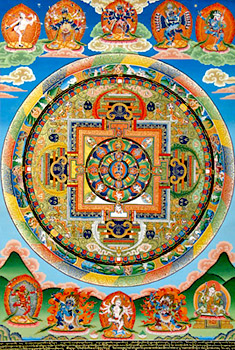The process of generation which is a component in the Path to Buddhahood involves understanding the diversity of existence. The process of generation or emanation involves removing of all impure tendencies and nourishing the pure sides of the personality. The purpose of the process of Generation is purification which is done through the emanation of the deities in the mandala practice. The Process of Generation can be accomplishes by following of certain steps.
Meditation on Hevajra Tantra
The Process of Generation involves Meditation on the Hevajra Tantra. It is a meditative process involving the production of figments of ideation through which the stream of the yogi`s consciousness matures. In order to be a fit vessel for the process of Generation in the very beginning the Master Consecration is bestowed. The meditation on Hevajra Tantra involves the preliminaries and the four stages of the Sole Hero Yoga. The preliminary practice involves five steps. They are taking refuge, ripening of the mind, making the offering, chanting the hundred syllable mantra and the Guru Yoga. The preliminaries are followed by the Four Stages of the Sole Hero Yoga. The first step is the realisation of void. In the second stage the yogi conceives himself as the wrathful one. In the third stage the yogi becomes the wrathful one and finally in the fourth stage or in the last stage the yogi`s consciousness is matured and he becomes suitable for the process of completion.
Meditation on the Nairatmya Mandala
 The emanation of the mandala of Nairatmya and her retinue-goddess is also part of the process of Generation. In this meditation two kinds of mandala are generally involved namely the Foundation Mandala and the Support Retinue Mandala. In this stage the yogi visualizes the principal deity of the mandala, Nairatmya arising from the seed-syllable. It has been said that by emanating the mandala of the Yoginis an individual is able to attain accomplishment.
The emanation of the mandala of Nairatmya and her retinue-goddess is also part of the process of Generation. In this meditation two kinds of mandala are generally involved namely the Foundation Mandala and the Support Retinue Mandala. In this stage the yogi visualizes the principal deity of the mandala, Nairatmya arising from the seed-syllable. It has been said that by emanating the mandala of the Yoginis an individual is able to attain accomplishment.
The Six-Phased Yoga
The Six-Phased Yoga is practiced in order to strengthen the mind of the yogi further. The six-phased yoga is an important step in wearing the yogi away from the gross to the subtle or from the physical to the metaphysical. The process of emanation involves the visualization of the various mandalas and the goddesses Nairatmya and others. The core of this meditative process is the identification of the microcosm with the macrocosm. Since the voidness cannot be comprehended the yogi is given certain tools in the form of seed-syllable, the deities, the corpse etc.
Thus, it can be concluded saying that by implanting the seed-syllable in the yogi`s own heart and identifying himself with Hevajra and Nairatmya he accomplishes the identification of himself with the void nature of all things and that is the essence of the process of generation.




















